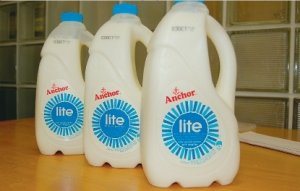However, while the intention may be good, it’s a move that may cause long-term problems for the dairy cooperative and its suppliers. In fact, Fonterra’s dairy farmer owners’ could end up not so much crying over spilt milk – but split milk prices!
This move risks stoking the myth – promulgated by critics –that products should be cheaper in the country where they are made or produced.
That is a fallacy that neither the dairy industry, the wider primary sector nor the New Zealand economy, as a whole, can afford.
Fonterra is the world’s leading supplier of premium dairy products. Fact is fresh, farmed milk costs more than manufactured drinks. Meanwhile, demand for dairy products is rising with prosperity in markets such as China and others.
The New Zealand market is one of many Fonterra supplies products to.
It is hypocritical and an unfair expectation that New Zealand dairy farmers should have to subsidise buyers of dairy products in this country. People living in competitive economies expect to pay international prices for all products. High world dairy prices are good news for New Zealand and we should pay no less, nor more, than milk is worth.
New Zealand consumers don’t expect cheaper or subsidised products from the plethora of international banks, insurance and oil companies based in this country.
Nor should they expect that of Fonterra – one of the few, truly New Zealand-based, successful international trading companies.
It appears Fonterra’s move to cut local milk prices comes after pressure began mounting last year from consumer advocates, as well as the aforementioned self-serving politicians, about rapidly rising milk prices – in the domestic and international market.
This led to calls for the Commerce Commission to investigate competition in wholesale and retail milk supply and for Parliament’s commerce committee to hold an inquiry. The commission found supermarkets and wholesalers to be competitive enough.
The focus then turned to the farmgate price, which is set by Fonterra.
However, when Fonterra’s new chief executive Theo Spierings came on board last September, one of his first public utterances was a promise to look at local retail prices. The dairy co-operative seemed to take much of the sting out of the high local-price claims when, at the end of last year, it announced plans to re-introduce free milk in primary schools.
Spierings says free milk in schools is part of a push by Fonterra to make milk more available to New Zealanders and boost local milk consumption. As the New Zealand Herald opined in an editorial in early January: “If falling consumption is the real reason Fonterra has now decided to drop its price, it is a sound commercial decision and the company should present the decision in those terms… not pretend it is an act of generosity or protection.”
No doubt rising milk prices have made life tough for local consumers, but so have rising petrol prices and the international recession. The problem is straightforward: local dairy prices reflect international markets.
Fonterra is not doing itself, local consumers or its farmer shareholders any favours playing cheap public relations stunts (which may turn out to be rather costly) to try to appease its critics.
As former boss Andrew Ferrier explained last year when the milk price row first erupted: “Dairy prices are cyclical; they will come down again.” So when prices fall, will these same critics – who, in effect, want subsidies on local milk prices – demand domestic consumers pay a premium to dairy farmers to supplement their declining incomes? As the Tui billboards say: Yeah, right!
Meanwhile, Fonterra will be left with a legacy of not being able to charge real prices for its products in the New Zealand market.
















